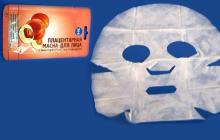Count the letters A, B, C and D in your answers. Then compare the number of answers A with the number of answers B and C with D. Find your option.
1. When buying a birthday gift for your child, you are more likely to choose the thing that...
a) will be beneficial;
b) will bring him joy.
2. Which toys does your child like best (at the appropriate age)?
c) Construction sets and cars;
G) Stuffed Toys and dolls.
3. When playing a new game with your child, a little difficult for him, you...
c) you try to give in to him so that his self-esteem does not suffer;
d) do not give in, being sure that the child must learn to deal with life’s difficulties.
4. When teaching a child to follow a daily routine, parents...
a) teach him how to manage his time;
b) they risk interfering with the natural development of his personality.
5. Do you think your child's personality is more like...
a) on your own;
b) on the character of the spouse.
6. It often happens that your child shows demonstrative disobedience...
a) in response to punishment;
b) for no reason.
7. If you are unhappy with your child, then try...
c) let him understand this by his behavior, without expressing any complaints;
d) explain to him that he deserves censure.
8. Is it worth punishing a child for aggressive behavior in relation to loved ones?
c) Yes, the child must learn to appreciate loved ones and understand that they always wish him only the best;
d) no, this will teach the child to hide or suppress his aggression, but nothing more.
9. Do you think it is appropriate to punish children for a failed attempt at pranks or misdeeds?
a) Yes, this will teach the child to be more disciplined and, in addition, will prevent the next similar action;
b) no, a child can only be punished for specific offenses.
10. In your opinion, child...
c) not being frank enough with you;
d) loves to share his little secrets with you.
11. What does your child like best?
a) When you communicate with him as an adult;
b) when you give him the opportunity to feel like a child.
12. When helping your child with homework, you believe that...
c) so teach him to be diligent and conscientious;
d) in general, you interfere with the development of his independence.
13. Remember what thoughts came to you first of all when you found out that you were having a child?
a) That he will be successful and, having matured, will achieve a lot;
b) that it will strengthen your family relationships, giving additional meaning to family life.
14. Having witnessed a family quarrel, your child usually strives...
c) take on the role of a conciliator;
d) run away, hide.
A is more than B, C is more than D. C you decided to put your whole soul into your child, you place it on him big hopes! For you, this child is an opportunity to make your unfulfilled dreams come true. But think about it, does he need it? If your child decides to go his own way, drown out the reproaches of ingratitude.
A is less than B, C is more than D. You are probably trying your best to protect your child from all the misfortunes in the world. However, you run the risk of growing a greenhouse plant! Especially if you have a son. By freeing your child from your care, you will help him become independent.
A is more than B, C is less than D. You are trying very hard to raise your child. a good man, instill in him useful character traits, teach him how to live. But your child is still just a child! Be patient and do not be too demanding and categorical, both in your actions and in your words, so as not to cause moral injury to your child.
A is less than B, C is less than D. It is possible that raising a child is beyond your competence. This is absolutely the wrong approach. You probably consider yourself one of the democratic parents, you try not to tire your child with excessive control and do not seek to impose your guardianship on him. However, a child whose behavior is almost completely uncontrolled by his parents will find it difficult to learn self-control, which will inevitably create problems for him in adulthood.
If the difference between A and B, C and D in absolute value does not exceed 2(for example, A - B = 1; D - C = 2), then you can be congratulated - you are a wonderful parent. You know how to be both moderately strict and moderately caring. You know and understand your child well and have influence over him.
Test. Are you a good parent?
You can answer the questions of this test “Yes”, “No”, “I don’t know”
Do you often react to some of your child’s actions with an “explosion” and then regret it?
Do you sometimes take help or advice from friends when you don't know how to respond to your child's behavior?
Are your intuition and experience the best advisers in raising a child?
Do you sometimes trust your child with a secret that you wouldn't tell anyone else?
Are you offended by other people's negative opinions about your child?
Do you ever ask your child for forgiveness for his behavior?
Do you think that a child should not have secrets from his parents?
Do you notice differences between your character and the character of your child that sometimes surprise (delight) you?
Do you worry too much about your child's troubles or failures?
Can you resist buying an interesting toy for your child (even if you have the money) because you know the house is full of them?
Do you think that up to a certain age, the best educational argument is physical punishment (belt)?
Is your child exactly what you dreamed of?
Does your child give you more trouble than joy?
Do you sometimes feel like your child is teaching you new thoughts and behaviors?
Do you have conflicts with your own child?
Calculations of results.
For each “yes” answer to the questions:
2,4,6,8,10,12,14- 10 points
For each “no” answer to the questions:
1,3,5,7,9,11,13,15 -10 points.
“I don’t know” -5 points.
Calculate your points.
100-150 points: You have great opportunities to understand your own child correctly. Your views and judgments are your allies in solving various educational problems. If this is accompanied by such open and tolerant behavior in practice, you can be recognized as an example worthy of emulation. For the ideal you need one small step. This could be your child's opinion. Will you take the risk?
50-99 points : You are on the right road to better understanding your own child. You can resolve your temporary difficulties or problems with your child by starting with yourself. And don’t try to make excuses about lack of time or your child’s nature. There are several issues that you have influence over, so try to use it. And do not forget that understanding does not always mean accepting. Not only the child, but also your own personality too.
0-49 points : It seems that one can only sympathize more with your child than with you, since he did not end up with a parent - a good friend and guide on the difficult road of gaining life experience. But all is not lost. If you really want to do something for your child, try something different. Maybe you can find someone who can help you with this. It will not be easy, but in the future it will return with gratitude and the established life of your child.
Test “Are you a good parent?”
Target: identify the ability of parents to understand their child, the ability to raise him correctly.
Instructions: The questions asked below must be answered “yes”, “no”, “I don’t know”.
Questions.
- Do you often react to some of your child’s actions with an “explosion” and then regret it?
- Do you sometimes use help or advice from others when you don't know how to respond to your child's behavior?
- Are your intuition and experience the best advisers in raising a child?
- Do you sometimes happen to trust your child with a secret that you would not tell anyone else?
- Are you offended by other people's negative opinions about your child?
- Do you find yourself asking your child for forgiveness for their behavior?
- Do you think that a child should not have secrets from his parents?
- Do you notice differences between your character and the character of your child that sometimes surprise (delight) you?
- Do you worry too much about your child's troubles or failures?
- Can you resist buying an interesting toy for your child (even if you have money) because you know that the house is full of them?
- Do you think that up to a certain age, the best educational argument for a child is physical punishment (belt)?
- Is your child exactly what you dreamed of?
- Do you sometimes feel like your child is teaching you new thoughts and behaviors?
- Does your child give you more trouble than joy?
- Do you have frequent conflicts with your own child?
Calculation of results:
For each answer “yes” to questions: 2, 4, 6, 8, 10, 12, 13, as well as “no” to questions: 1, 3, 5, 7, 9, 11, 14, 15 - you get 10 points. For every “I don’t know” you get 5 points. Count up your points.
If you scored from 100 to 150 points, then you have great ability to correctly understand your child. Your views and judgments are your allies in solving various educational problems. If this is accompanied by such open and tolerant behavior in practice, you can be recognized as an example worthy of emulation. For the ideal you need one small step. This could be the opinion of your own child. Take a risk.
If you scored from 50 to 99 points, then you are on the right road to a better understanding of your own child. You can resolve your temporary difficulties or problems with your child by starting with yourself. And don’t try to make excuses based on lack of time or your child’s nature. There are several issues that you have influence over, so try to use it. And don’t forget that understanding does not always mean accepting. Not only the child, but also your own personality too.
If your total score is from 0 to 49 points, then it seems that you can sympathize more with your child than with you, since he did not end up with a parent - a good friend and guide on the difficult road of gaining life experience. But all is not lost. If you really want to do something for your child, try to find someone who will help you with this (a specialist). It will not be easy, but in the future you will return with gratitude and the established life of your child.
test “Are you a good parent?”You can answer the questions of this test “yes”, “no”, “I don’t know”.
1) You often react to some of your child’s actions with an “explosion” and then regret it.
2) Sometimes you use help or advice from friends when you don’t know how to respond to your child’s behavior.
3) Your intuition and experience are the best advisers in raising a child.
4) Sometimes you happen to trust your child with a secret that you would not tell anyone else.
5) You are offended by other people’s negative opinions about your child.
6) You happen to ask your child for forgiveness for your behavior.
7) You believe that a child should not have secrets from his parents.
8) You notice differences between your character and the character of your child, which sometimes surprise (delight) you.
9) You worry too much about your child’s troubles or failures.
10) You can resist buying an interesting toy for your child (even if you have money) because you know that the house is full of them.
11) Do you think that up to a certain age, the best educational argument for a child is physical punishment (belt).
12) Your child is exactly what you dreamed of.
13) Your child gives you more trouble than joy.
14) Sometimes you feel like your child is teaching you new thoughts and behaviors.
15) You have conflicts with your own child.
Calculation of results.
For each answer “yes” to questions: 2, 4, 6, 8, 10, 12, 14, as well as for the answer “no” to questions: 1, 3, 5, 7, 9, 11, 13, 15 you receive 10 points each. For each “I don’t know” you get 5 points.
100–150 points.
You have great opportunities to understand your own child correctly. Your views and judgments are your allies in solving various educational problems.
If this is accompanied by such open and tolerant behavior in practice, you can be recognized as an example worthy of emulation. For the ideal you need one small step. This could be your child's opinion. Will you take the risk?
50–99 points.
You are on the right road to better understanding your own child. You can resolve your temporary difficulties or problems with your child by starting with yourself. And don’t try to make excuses about lack of time or your child’s nature. There are several areas in which you have influence over your child; try to use it. And don’t forget that understanding does not always mean accepting. Not only the child, but also your own personality too.
0–49 points.
It seems that one can only sympathize with your child because he did not end up with a parent - a good friend and guide on the difficult road of gaining life experience. But all is not lost. If you really want to do something for your child, try something different. Maybe you can find someone to help you with this. It will not be easy, but in the future it will return with gratitude and the established life of your child.
Who doesn't want an answer to this question! That is why we offer you this mini-test.
Mark the phrases that you often use when communicating with your children.
- How many times do I have to tell you! (2)
- Please advise me. (1)
- I don't know what I would do without you! (2)
- And who are you born into? (2)
- What wonderful friends you have! (1)
- Well, who do you look like! (2)
- I'm on your time! (2)
- You are my support and helper! (1)
- What kind of friends do you have! (2)
- What are you thinking about! (2)
- How clever you are! (1)
- What do you think, son (daughter)? (1)
- Everyone's children are like children, and you? (2)
- How smart you are! (1)
Now count the total points and find the answer. Of course, you understand that our mini-test is only a hint of the actual state of affairs, because no one knows what kind of parent you are better than yourself.
7-8 points. You live with your child in perfect harmony. He truly loves and respects you. Your relationship contributes to the development of his personality!
9-10 points. You are inconsistent in communicating with your child. He respects you, although he is not always frank with you. Its development is subject to the influence of random circumstances.
11-12 points. You need to be more attentive to your child. You enjoy his authority, but, you must admit, authority is not a substitute for love; the development of your child depends on chance to a greater extent than on you.
13-14 points. You yourself feel that you are going down the wrong path. There is mistrust between you and the child. Before it’s too late, try to pay more attention to him, listen to his words!
Advice: We are not the masters of our children's lives. We cannot know their fate. We don't fully know what is good and what is bad for their future. Therefore, we will be more careful in all decisions that may affect the child’s path.



